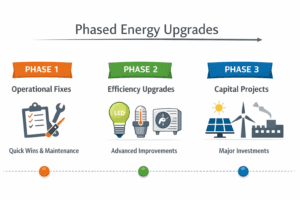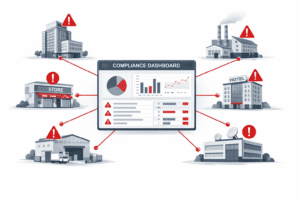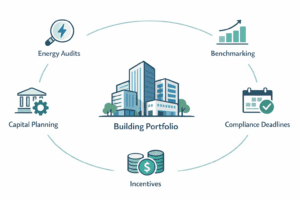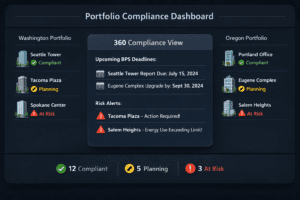Introduction
In an increasingly eco-conscious world, stringent measures like the Benchmarking Law have emerged not merely as guidelines but as indispensable mandates for the real estate industry. At its core, the Benchmarking Law demands that building owners and managers report their energy and water usage annually. This statute serves to cast a spotlight on the consumption patterns of buildings, prompt energy conservation, and foster an environment where sustainability is a collective responsibility.
Moreover, the law helps to weave environmental accountability into the fabric of property management while encouraging competitive efficiency among buildings. As significant as these regulations are for paving the way toward a greener future, they are frequently misunderstood or underappreciated, leading to a myriad of avoidable errors. This comprehensive guide walks you through the common pitfalls associated with the Benchmarking Law and offers valuable insights on how to circumvent them to ensure full compliance.
Understanding the Benchmarking Law
To fully appreciate the significance and implications of the Benchmarking Law, building owners and managers must first understand its scope and objectives. The law is not a mere suggestion; it is a firm requirement intended to drive a large-scale change in how buildings consume resources. By making water and energy consumption data publicly accessible, the law aims to ignite a sense of transparency that fosters informed decision-making by occupants and owners alike.
This level of accountability is designed to incite a broad spectrum of positive outcomes, including the reduction of greenhouse gas emissions, the encouragement of market-driven improvements in building performance, and ultimately, the stimulation of innovations in energy efficiency. In essence, the Benchmarking Law isn’t just about complying with a legal requirement—it’s about playing an active role in a movement towards a more sustainable and resilient built environment.
Common Mistake #1: Ignoring the Law

Regrettably, the first and perhaps the most egregious error that building owners and managers make is to underestimate the significance of the Benchmarking Law. Some view it as a trivial or burdensome task that can be overlooked without consequence. This dangerous oversight can lead to severe ramifications, including hefty fines that escalate with repeated non-compliance. But the impact goes beyond the pocketbook.
The reputational damage for failing to comply can be profound, potentially deterring prospective tenants who prefer environmentally responsible landlords and diminishing the property’s value in the eyes of investors. Ignorance of the law also means missing out on the opportunity to pinpoint energy inefficiencies that could be costing you far more in the long run. Recognizing the Benchmarking Law as a critical component of building management ensures that you’re not just following a mandate but are also committing to a more profitable, sustainable future.
Common Mistake #2: Inaccurate Data Reporting
Collecting and reporting data with precision is crucial for the integrity of the Benchmarking Law. Each kilowatt-hour and gallon of water must be documented with accuracy. Data distortion, intentional or otherwise, can significantly skew understanding of a building’s energy performance and subsequently, the effectiveness of the law itself.
To ensure accuracy, it is vital that data gathering is approached systematically. Energy consumption data should be collected using reliable and calibrated tools while methodologies endorsed by the law should be strictly adhered to. Additionally, regular audits and cross-verification of data can safeguard against inaccuracies. Remember, meticulous data isn’t just about legal compliance; it’s about setting a benchmark that genuinely reflects your building’s performance and paves the way for measurable improvements.
Common Mistake #3: Late Compliance Reporting
Staying on schedule with compliance reporting can be challenging, yet it’s imperative to avoid the penalties associated with tardiness. The Benchmarking Law sets clear deadlines for submission of energy and water data, and it’s crucial that these deadlines are treated with the utmost seriousness. Late reports can attract fines, but perhaps more importantly, they can disrupt the reporting process and delay the implementation of energy-saving measures.
To promote punctuality, building managers should establish a comprehensive timeline that accounts for the collection, review, and submission of data, culminating well before the official deadline. This internal schedule should factor in potential hiccups, such as technical difficulties or gaps in data collection, allowing for corrective actions without jeopardizing the submission timeline. Staying ahead of the game ensures that reporting is routine rather than a race against the clock.
Common Mistake #4: Lack of Understanding about Energy and Water Usage
An intimate understanding of your building’s energy and water usage is paramount when it comes to true compliance with the Benchmarking Law. A superficial approach that meets the bare minimum requirements for reporting is insufficient for leveraging the full benefits that come with compliance. By diving deep into the specifics of how and where your building uses resources, you can uncover areas of wastage, leading to targeted measures that can significantly reduce consumption.
Harnessing tools like energy management software or engaging with sustainability consultants can equip you with the knowledge and skills necessary to analyze consumption patterns proficiently. Having a granular understanding of your resource utilization not only ensures compliance but also reveals opportunities for cost savings and environmental impact reduction.
Common Mistake #5: Failing to Regularly Update Information

Benchmarking is not a static process. Your building’s energy and water usage data is not immutable—it evolves with operational changes, renovations, and system upgrades. It is essential that the information you report reflects the most current state of your building. Failing to update data can result in a false portrayal of your building’s performance and potential non-compliance with the law.
Develop a system for constant data review and updates, ensuring that any changes in the building’s structure, systems, or occupancy are recorded and reported. This constant vigilance not only satisfies the legal requirements but also guarantees that the efforts to improve your building’s performance are based on the latest information.
Conclusion
The Benchmarking Law is more than a regulatory hurdle; it is a beacon guiding the real estate sector towards a sustainable revolution. The common mistakes outlined can be pitfalls that undermine the efficacy of the law, but, more critically, they represent missed opportunities for building owners and managers to engage in responsible environmental stewardship. By embracing the regulation with diligence and foresight, we pave the way not just for compliance but also for a future where our buildings are as efficient as they are effective in serving the people who inhabit them. Let this guide serve as your map to navigate the complexities of the Benchmarking Law, ensuring that your journey toward compliance is both smooth and rewarding.
VertPro.com serves as a resourceful platform for property owners and managers seeking to enhance their buildings’ energy efficiency. The site offers a range of services, including Commercial Energy Audits, Benchmark Compliance consultancy, and a Construction Marketplace. At the heart of VertPro® is a suite of SaaS technology-based solutions designed to assist in navigating the complexities of Energy Benchmarking and Energy Audits/RCx Plus, while ensuring adherence to over 60 Energy Benchmarking and Energy Efficiency Laws across the country.
For those looking to improve their property’s energy usage and operational value, VertPro.com provides a diverse array of tools and information. The site aims to facilitate a better understanding of energy efficiency practices and legislation, helping building owners and property managers make informed decisions about their energy strategies while complying with all energy ordinances and laws.















